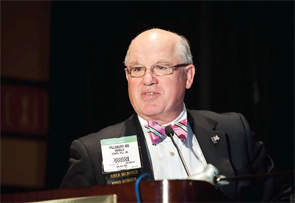CHICAGO — Harold Pillsbury, MD, chair of otolaryngology-head and neck surgery at the University of North Carolina School of Medicine in Chapel Hill, is known as one of the more colorful figures in his field, with a bright smile—usually accompanied by a bow tie—and a forthright demeanor.
In addition to his long list of honors and publications, “He is probably one of the most loyal, thoughtful, reliable people anyone could ever want to call a friend,” said Gerald Berke, MD, president of the Triological Society.
Dr. Pillsbury—who, as he himself said, is “known for my one-liners”—gave an address here as Guest of Honor at the Annual Meeting of the Triological Society on April 29. He shared some of his favorite sayings, giving his thoughts on each and imparting lessons and motivation along the way. Here’s a synopsis:
Managed care is about managed cost, not managed care: “People size us up not for what they can get from us and care for the patient but what they can get from us for as little as possible, as if we’re a generic box of corn flakes. And this is a problem that we must resist…. The patients bear the brunt of these decisions that are made at a macro business level.”
If you live long enough, you will see everything: “I’ve never ceased to be amazed by what happens either in my clinic or in my hospital or in the world, in terms of things I never thought would come to pass. And some of it’s really good and some of it’s not so hot. But never believe that anything that could be possible won’t occur.”
Once a complication occurs, no one cares how fast you did the operation: “How many times do you hear people say, ‘Oh, I can do ten tonsillectomies in this one morning’? Well, I can tell you something. Once a complication occurs, nobody cares how fast you did the operation.”
It’s never a question of inoperability; it’s only a question of what you are willing to live without: “At the end of the day, it’s whatever that patient needs to get through whatever part of their life they feel is necessary that makes an operation something they’re willing to sustain or not. A lot of times you make the decision not just for you, or not just for the disease state, but for the patient. So, the patient and you, it’s a covenant between you and them about what they want to see done.”

Leave a Reply